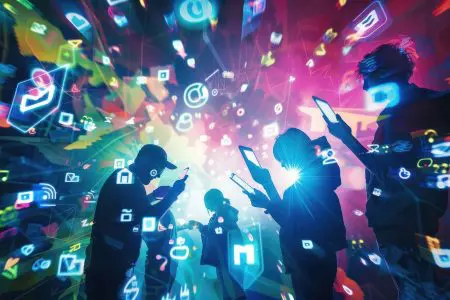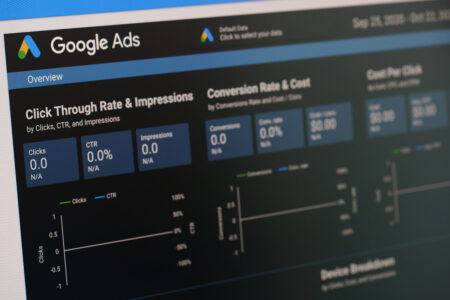After a week in which Google announced its own incoming AI-generated language model to rival ChatGPT, and Bing announced the integration of an optimised ChatGPT into its search engine, the big news just keeps on coming!
In this instalment of our ‘How AI is Reshaping the Industry’ series, we focus on Google’s recent shift in stance when it comes to using AI-generated content on the web and what the knock-on effects could be for digital copywriters.
What’s been said?
In April 2022, Google’s Search Advocate, John Mueller said:
“[…]People have been automatically generating content in lots of different ways. And for us, if you’re using machine learning tools to generate your content, it’s essentially the same as if you’re just shuffling words around, or looking up synonyms, or doing the translation tricks that people used to do. Those kind of things.
My suspicion is maybe the quality of content is a little bit better than the really old school tools, but for us it’s still automatically generated content, and that means for us it’s still against the Webmaster Guidelines. So we would consider that to be spam.”
Now, less than a year later, Google’s guidance about AI-generated content, published on Wednesday 8th February, says (in part):
“[…]It’s important to recognize that not all use of automation, including AI generation, is spam. Automation has long been used to generate helpful content, such as sports scores, weather forecasts, and transcripts. AI has the ability to power new levels of expression and creativity, and to serve as a critical tool to help people create great content for the web.”
The article goes on to specifically advocate the creation of valuable, people-first content if opting to use AI to generate content, followed by some FAQs around the whys and wherefores of AI-generated content.
What this means for digital content writers
It’s fair to say that the question is no longer about whether AI is the future of copywriting, AI is here in the present and it can be used to generate copy—an approach which Google has sanctioned—so now the question becomes “how will this change things for digital copywriters and content creators?”
The arrival of two new cutting-edge language models combined with Google’s shift in stance will undoubtedly impact the role of the digital copywriter. However, it would be foolish to assume there is no longer any need for human copywriters.
As impressive as the current AI content generators are and as significant as their potential is, they simply aren’t sophisticated enough to replace the human copywriter. The fact is, they work better as tools in the hands of a copywriter as opposed to a standalone resource.
Having said that, here are some of the ways in which the role of the digital content manager may begin to evolve in light of this new tech:
Less focus on content creation, more focus on content optimisation
Although it’s probable that, in some cases, creating content will become a more automated process than it is now, there will still be plenty of work to do once AI spits out a first draft.
You’ll still need a seasoned copywriter to optimise content for things like:
- Brand tone
- Keywords
- Nuances
- Spelling preferences
- General best practice
Regardless of who or what is writing content, it’s still the copywriter’s job to ensure the quality, accuracy and authenticity of that content.
Perfecting the art of the prompt
As things currently stand, these super-duper AI language models are only as effective as the person using them. Sure, it’s easy enough for anyone to tell it to “write an article about X”, but to truly make the most of the software, the prompt is paramount. A digital copywriter is best placed to shape the outcome of the AI-generated content by setting the specific parameters of the brief/prompt given to it.
In this new landscape, digital copywriters who have a strong understanding of AI technology and its limitations will likely be in high demand. What’s more, it’s crucial that copywriters remain responsible for making sure AI-generated content is used in an ethical and effective way.
A shift towards the strategy side of content
Though content strategy already sits within the remit of many digital content writers, it’s likely that we’ll see a more significant shift towards (and emphasis on) that side of the role industry-wide.
The role of the content strategist involves planning and managing content to align with business goals while also meeting the needs of the target audience. Research also factors heavily into this role, as does keeping up to date with all the latest industry trends and tech. Day-to-day content strategist activities can also include things like:
- Carrying out content gap analyses
- Conducting audience research
- Defining content goals to align with the overall marketing strategy
- Developing and managing calendars to inform content creation
- Measuring and analysing content performance for continuous improvement
The gift of time and resource
With the combination of a tool which can generate content and a solid understanding of how to get the most out of the tool, it’s fair to say that the time it takes to create content could be significantly reduced. That said, it’s still crucial that enough time is spent reviewing, fact-checking, optimising, and aligning content to the brand tone.
Writer’s block unblocked
Using AI content generators to help side-step the frustration of writer’s block is another handy benefit. These AI language models work wonders when used for inspiration and idea generation, so they can certainly be used as a springboard to help copywriters overcome the curse of the blank page.
The long and the short of it
So, other than the fact that it’s both an exciting and terrifying time to be a digital content writer, here’s what I hope you take away from this article:
- Just because we can use AI-generated content on the web, doesn’t mean we always should.
- The value, usefulness and relevance of your content (whether self-written or AI-generated) still reign supreme.
- AI language models are an incredible tool, but they’re not replacements for copywriters. That said, roles are likely to be redefined to a degree.
- AI-generated content (and indeed, AI in general) will continue to revolutionise the landscape of digital marketing and, let’s face it, probably all industries and sectors.
Here at Coast Digital, we keep up to date with all the latest industry innovations and embrace the changes that come with advancing AI technology. If you’d like to find out how we can support your digital content needs, reach out to us today.
- The Ultimate AI Showdown: OpenAI’s ChatGPT Vs. Google’s Bard
- AI AI AI: Another day, another language model. Enter Bing.
- Bot Vs Being: Is AI The Future Of Copywriting? (The Being)
Let's collaborate
Partner with us
Let’s work together to create smarter, more effective solutions for your business.
Related blogs
Who we are
Explore how our culture and expertise fuel digital innovation
Join us








